Growing Up
In conversation with Prince Swaray of the vertical farming company, Bowery.
Bowery, formerly known as Bowery Farming, is the largest indoor vertical farming company in the United States. Founded by Irving Fain in 2015, the company uses a proprietary operating system to customize the environments of each leafy green, lettuce, herb, and fruit they grow, allowing them to yield tasty produce year-round, avoid the use of pesticides, and guarantee freshness for customers.
Contrary to popular belief, Bowery is not named for the avenue in New York City (though it is headquartered nearby), but after an old Dutch word for farm. The moniker reflects the company’s reverence for tradition, while it’s actively trying to revolutionize our food system for the future, growing more produce with less land and reducing the miles between farm and plate. Here, Bowery’s senior sales director Prince Swaray shares more about the company’s mission and its current leafy offerings.
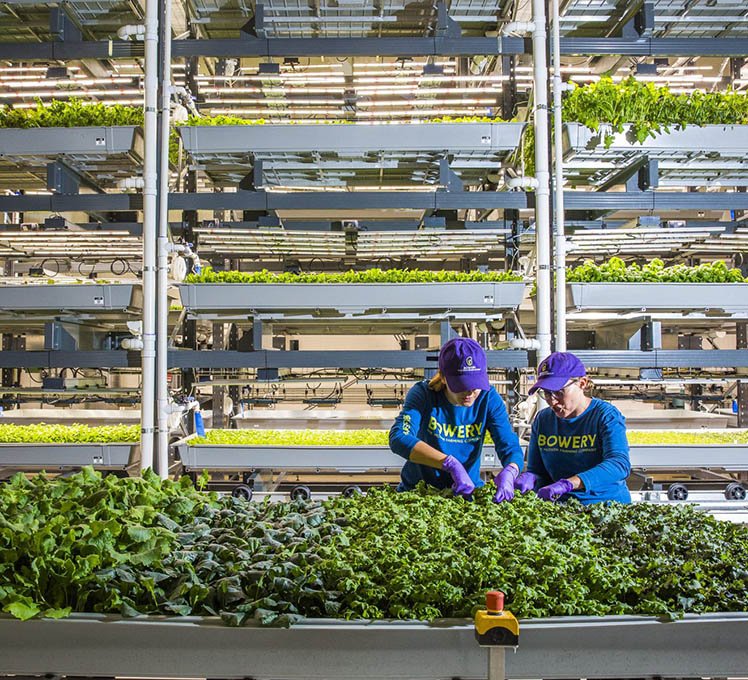
Photography courtesy of Bowery
Mast Journal: What is Bowery’s mission?
Prince Swaray: Our mission is to help transform produce—the ways that folks think about eating it and what that means regarding our impact on the environment. We’re bringing food closer to the people who are consuming it, reducing a lot of the miles that are currently baked into our food production. We do that by growing all of our produce indoors in environmentally-controlled, state-of-the-art farms. One located in Maryland, one located in Pennsylvania.
One thing I really enjoy about Bowery is that as this indoor vertical farming space grow, we are leading the way. We’re making sure that our products are always pesticides free—there’s no need to wash the produce—and free of a lot of other things that might come in conventional or even organic farming. Consumers know that when they have a Bowery product, they're getting a product that was freshly grown, harvested within days, and free of any contaminants.
MJ: All of those things are super important to Mast Market, from the sustainability to the lack of contaminants to the freshness of the produce.
PS: For sure. Bowery is one of the brands at the forefront of being very visible, very open, and very transparent with what we're producing, what we're putting in front of our consumers.
MJ: Totally. What is Bowery’s origin story?
PS: I've been at Bowery for about three years now, but we just celebrated our eighth anniversary as a company. The founders are passionate about, as I said, finding ways to transform the produce food system. They wanted to create a blueprint for what can be done to food to be able to bring the freshest, cleanest products to consumers. They started out very small. The first farm was located in New Jersey and was not as sophisticated. They were figuring it out as they went along. What they've been able to do in the last eight years is nothing short of extraordinary, going from hand packing and manual labor to automation and raising the standards and opening our two world-class facilities.
MJ: That’s so impressive! What made you want to work at Bowery?
PS: I've been in food my whole career, working with traditional CPGs, some of the bigger brands. I've always been passionate about food. I believe food is obviously a very personal, intimate thing. You remember a lot of the brands you grew up with. And when Bowery reached out to me, I didn't know much about this space. I would just go to a store and I’d buy whatever vegetable I needed. If I wanted lettuce or cabbage, I'd just grab it without really looking at the labels. Bowery is trying to educate and raise awareness about where your produce comes from. It excited me because they had a purpose. We’re obviously a for-profit company, but I think whenever you have founders who have a purpose behind what they're doing, it adds a little gravitas to it. It's just been really rewarding, working at Bowery. Our CEO Irving Fain says that we're doing very hard work. There are always going to be easier options for folks, but that's not the path that we take. So that challenge actually excited me.
MJ: It is exciting! What is your role at the company?
PS: I'm the senior director of national accounts on the commercial team, which is part of the sales organization. I'm responsible for managing our national customers. We have a variety of customers that we distribute to right now, but I'm directly responsible for our Amazon, our Whole Foods, and our Walmart business, as well as some of our larger distributors, like UNFI, that we partner with.
One part of my job is maintaining and fostering and nurturing those relationships to drive more revenue. I want to drive more distribution in terms of getting more Bowery products there, growing both our sales and our customer’s sales. But also every person at Bowery’s job is to figure out ways to grow the business. So I am constantly searching for new opportunities to have Bowery show up in places where consumers want to find them. I’m really trying to push the forward both profitably and awareness of Bowery.
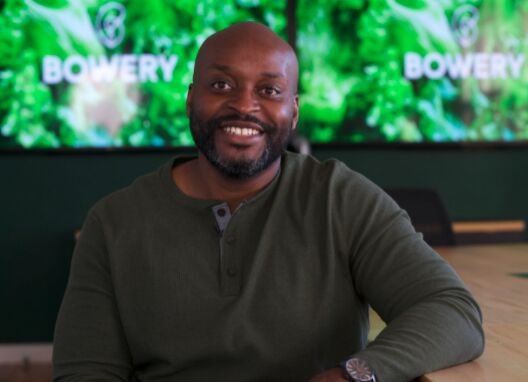
Prince Swaray
MJ: And how do you sell Bowery to stores? What are the biggest selling points?
PS: One of the first things we talk about is food waste. A lot of produce is thrown out because of a variety of reasons, whether it be how long it takes to get from its origin to the stores or substandard quality. So I like to highlight that we harvest our product daily, which means you're getting the product as fresh as pretty close to possible. You won't have to worry about product going bad on the shelf or having low quality that doesn't meet consumer standards, so there's a lot less waste. I constantly just want to reiterate that you're going to get fresh product. You're also going to get consumers who are looking for minimal exposure to contaminants and whatnot. And Bowery products are pesticide-free. Shoppers are looking for these kinds of brands.
MJ: Definitely. What about the delicious factor? Is the taste also a selling point?
PS: I'm biased obviously, but I believe our taste is second to none when you talk about the leafy greens and herbs that we sell. My favorite product is our recently-launched spinach. Now, if you are familiar with indoor growing and vertical farming, you know spinach has been one of the hardest things to grow indoors for a variety of reasons. And recently, our amazing agriculture team has discovered a way to do that while still delivering the no pesticides, no need to wash, nutrient-dense product that we're excited about. When you stack our spinach across conventional organic spinach, there's a distinct difference in our quality and the taste that comes across.
MJ: That’s awesome. How does vertical farming work, exactly?
PS: I always caveat by saying that I'm not an actual scientist, but from what I can understand, we can create the specific, unique conditions that each cultivar needs to grow. We can grow our spinach in one part of our farm, we can grow our arugula in another part, and our baby butter in another. Instead of having just acres and acres of land to do this, we're able to do this within a contained space and deliver the yield and output that matches conventional farming. I'm really excited to work with Bowery’s agriculture science team to understand what a plant needs and how to give it the best life.
MJ: That’s super interesting. Aside from greens, what produce is Bowery currently growing?
PS: We have three herbs right now. We have cilantro, parsley, and basil. Our basil is our only ambient product. That's the only one that we encourage not to be refrigerated. We're excited about the freshness that our basil has. Usually, with herbs, you have to buy that bundle, but you might only need a small portion of it. So we have pack sizes that are the perfect amount that gives you what you want, but also minimizes food waste.
Now, we’re making our way towards fruit. Irving Fain wants Bowery to play across the entire produce section. Strawberry is probably the number one item in produce most of the year, but the quality and the taste of it varies. We were able to have a limited run of Bowery strawberries last spring, and it just basically showed what we're capable of and what we could do that differentiates us from our competition, who might just only be able to grow leafy greens or only be able to grow herbs. There is a lot of interest based on our limited run of strawberries.
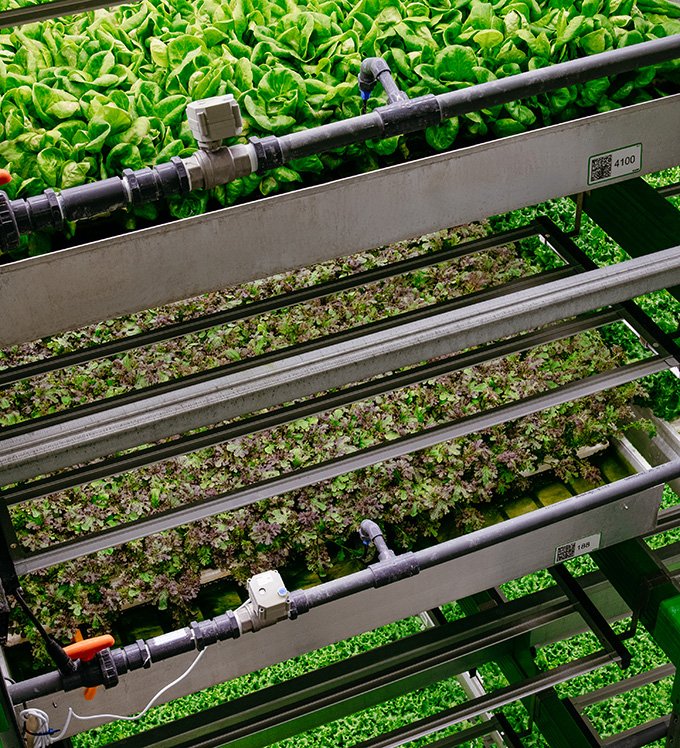
MJ: And you offer salad mixes, too?
PS: Yes. We launched our Bowery salad kits a year ago. We launched with three flavors to start. We want to find what the consumer is used to and wants, but also put a Bowery spin on it. So we launched a zesty Caesar, an avocado ranch, and a balsamic vinaigrette. All three of our salad kits have our crispy leaf lettuce in it, which we feel is the most forkable lettuce. It's a delicious crunch that you get in it. If you go buy a salad kit or a salad bowl, a lot of times the salad isn't even the main star of it. We wanted to make sure the salad stood out.
And in the kits, all of our proteins are non animal-based proteins. We’re super excited to bring that offering to the folks. We recently launched, this past summer, sesame ginger, to expand the line and we're also converting to a new format, a bowl that will be a little bit easier experience for consumers to use our product.
MJ: So you can eat right out of the bowl?
PS: You can eat out of the packaging right now. The salad kits are in the same clamshell that our leafy greens are in. But we're moving to what you would think of as a more traditional bowl, so it's a little more accessible.
MJ: Totally. And what are the farmer selection products?
PS: The farmer selection products are the freshest, most unique items that you might not find in everyday retail. The first item was our mustard frills, which was a delicious, spicy frilly lettuce that was originally supposed to be a rotational, in-and-out item, but it worked so well that we kept it as an everyday item. We had a green sorrel for about six months. Our most recent farmer selection item is our bok choy, which is usually sold by the bulb. We were able to cultivate it and have the leafy greens part of the bok choy as a single dish item. These items are very recipe driven.We're looking for customers who are trying to be more in the kitchen, discovering different flavors. They’ve been really well received.
MJ: They sound delicious. Can you talk about the company’s rebranding?
PS: One of the bigger changes is we went to what we call Bowery blue. If you go into the produce aisle, everything is green and things can get muddled together. We landed on the blue because it ties into images of water and freshness and things like that. And in our research, it just drove a lot of consumers to repurchase because it stood out. We wanted to really grab the consumer's attention. It launched late summer of this year and so far it's done really well. It really pops on the shelf. We've gotten some really positive feedback.
MJ: Definitely. What about the name change from Bowery Farming to Bowery?
PS: It speaks to us being more than what you would expect from a traditional produce company. We want to detach from a consumer's very narrow mind of what Bowery is and give us a lens to the future of what we can become.
More from The Journal
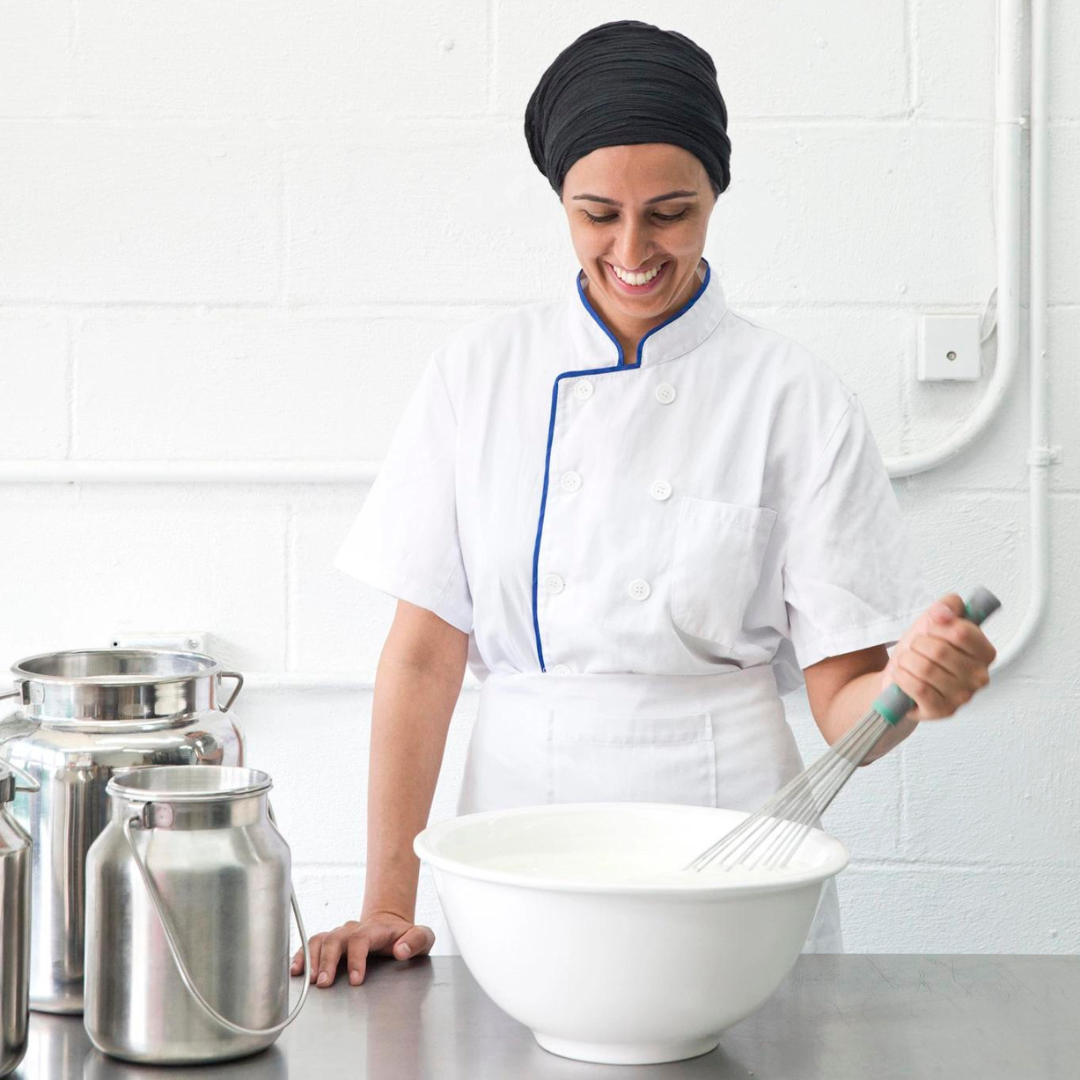
For Homa Dashtaki, the founder of small-batch yogurt brand The White Moustache, yogurt is so much more than a dairy product. It's her family tradition, it’s her Iranian heritage, and, most importan...
Read more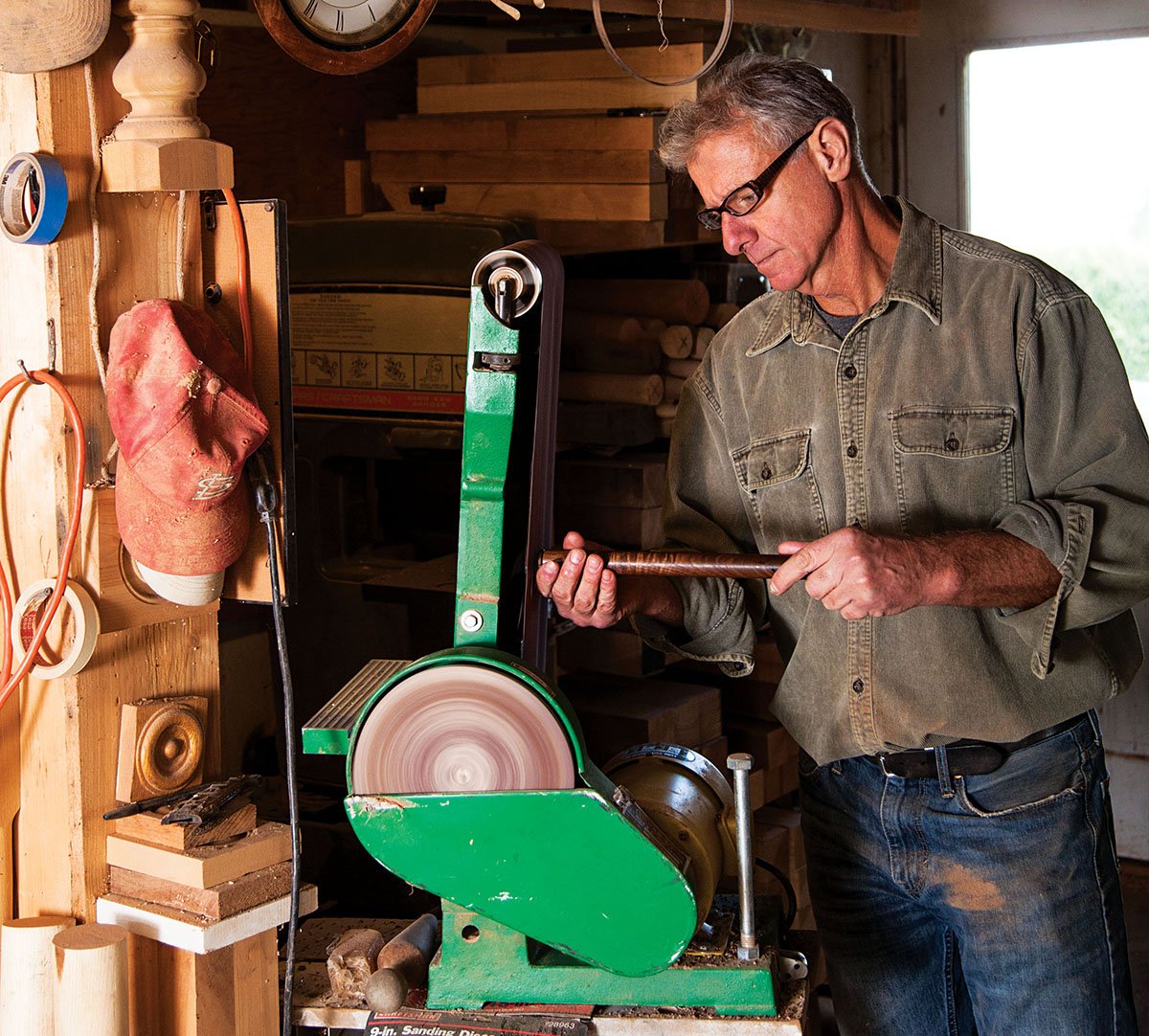
In conversation with artisan woodturner and founder of Vermont Rolling Pins, Ken Freeman. Here, he shares how he fell into woodturning and why his rolling pins are so special.
Read more